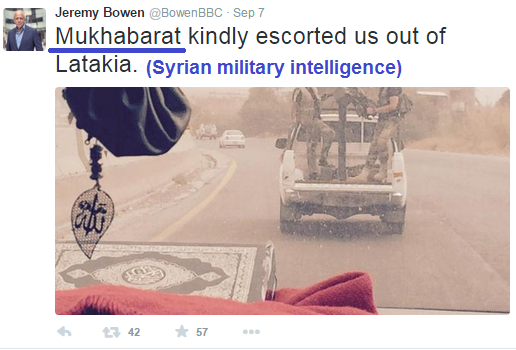In an article titled “Bashar al-Assad is still the problem” which appeared recently in the Telegraph, Shiraz Maher and Nick Kaderbhai observed that:
“The idea that the Assad regime’s violence is somehow morally or strategically different to that of jihadist actors in Syria has become fashionable among some sections of the Western media. Perhaps a symptom of fatigue or sympathies forged during time spent as guests of the regime, mainstream commentators such as Patrick Cockburn and Peter Oborne have been at the forefront of this trahison des clercs.
According to the Syrian Network for Human Rights, 95 per cent of all civilian deaths in the conflict have come from the regime. The refugees now fleeing to Europe do so as a direct result of Assad’s policies.”
As readers are already aware, the BBC – and in particular its Middle East editor – also appears to have been afflicted by that particular trend.
BBC News’ migrant crisis coverage: Bowen embeds with Assad
More BBC Bowen beating of the Assad regime drum
More BBC amplification of the ‘ISIS worse than Assad’ meme
However, it would appear that following Jeremy Bowen’s repeated uncritical promotion of Bashar al Assad’s agenda earlier this month, some damage control was deemed appropriate and that came in the form of an article by Charles Lister which appeared on the BBC News website’s Middle East page on September 28th under the title “Viewpoint: West ‘walking into abyss’ on Syria“.
Mr Lister writes:
“Amid recent geopolitical machinations, one simple reality appears to have been forgotten or purposefully ignored: Assad is not and should never be seen as a better alternative to IS. […]
Meanwhile, the Assad regime has conducted a consistent policy of intentional mass killing of civilians – first with air strikes and ballistic missiles, then with barrel bombs and widely alleged use of chemical weapons.
Bashar al-Assad has professionalised and industrialised the use of detention and torture to “cleanse” his own population, while imposing dozens of medieval-style sieges on vulnerable populations. He has consistently flouted UN Security Council resolutions and according to some sources, has been responsible for 95% of all 111,000 civilian deaths since 2011.”
Of course BBC audiences – who only a short time ago were informed that “the Syrian army has never, ever attacked or initiated any attack against a city or against a village” and that “the real threat in Syria is Islamic State, not the country’s leader” – may well find that this latest article only adds to their confusion seeing as it contradicts everything they were told in Jeremy Bowen’s numerous reports.
Rather than helping audiences to form a clear picture of what is happening in Syria and why so many people are fleeing to other countries as its public purpose remit demands, the BBC’s indulgence of Jeremy Bowen’s partisan reporting serves only to muddy audience understanding of this topic.




